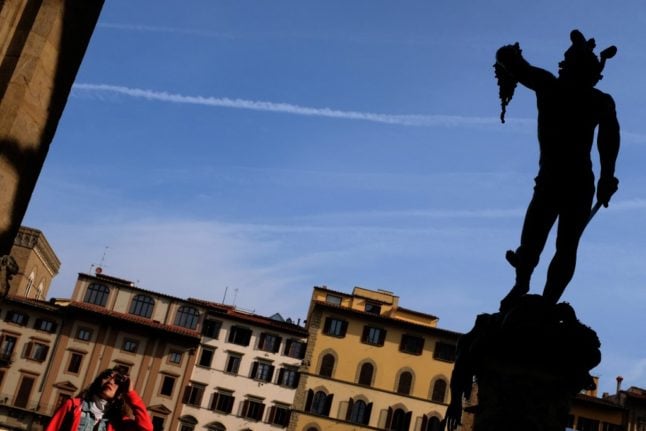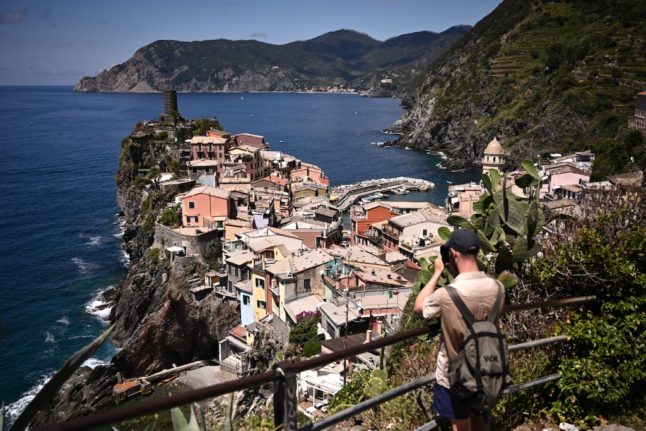The Tuscan city of Florence moved to ban new Airbnb rentals and other short-term tourist lets on Monday, as the local mayor said too many Florentine residents were being crowded out by visitors or having to live in buildings that resemble “apartment-hotels”.
Mayor Dario Nardella said the city needed local legislation to keep the number of tourist rentals down because government plans to tackle the issue had been “disappointing and inadequate”.
The measures, approved late on Monday, would not impact existing tourist rentals in the city, though they included the offer of a three-year local IMU tax break for landlords of existing short-term rentals who switch to longer-term leases.
READ ALSO: Why are long-term apartment rentals ‘disappearing’ in Italy?
Anyone found to be illegally letting their property could face a fine of up to €5,000 under the new rules,
Nardella said in a speech to a packed city hall on Monday evening that the number of apartments in Florence listed on Airbnb had shot up from 6,000 in 2014 to almost 14,378 today, and that during that time the average cost of monthly residential rents had soared by 42 percent.
This year, prices have increased by 15.1 percent, Nardella said.
“This means paying at least 500 euros a month for a single room.”
He added: “the 40,000 Florentines who live in the centre are complaining about finding themselves, all of a sudden, living in apartment-hotels.”
READ ALSO: What are Italy’s rules and taxes for Airbnb rentals?
People in many parts of Italy struggle to find an affordable rental due to low salaries and a lack of affordable housing, and in popular tourist destinations like Florence the problem is compounded by a growing preference among landlords for highly profitable short-term lets.
High inflation has further deterred landlords from offering longer-term lease contracts, which in Italy mean the monthly rent cannot be increased for at least four years.
In response to the problem, the Italian government has begun drafting a national law which would require a minimum stay of two nights at rentals in areas which attract a high number of tourists.
Nardella, a member of the centre-left Democratic Party (Partito democratico) which is in opposition at the national level, has long been critical of the government’s plan, saying it wouldn’t have an impact in Florence, where “the minimum average stay is already three nights”.
His council’s move to more tightly regulate short-term lets at a local level meanwhile was opposed by members of the hard-right parties which make up the ruling coalition government.
A representative of the local branch of the Forza Italia party said following the approval that it would appeal against the ban at Florence’s administrative court, national broadcaster Rai reported.
READ ALSO: OPINION: Why more of Italy’s top destinations must limit tourist numbers
Councillors for Prime Minister Giorgia Meloni’s Fratelli d’Italia party described the move as “wrong, untimely and discriminatory,” while the head of the local group of centrist parties said the resolution had come “late, given that the large [investment] groups have already made every possible speculation.”
Meanwhile, Lorenzo Fagnoni, the president of tourist rental business association Property Managers Italia, said a ban on new lets was “a completely incorrect decision that goes against the liberalism of the market” and which “prevents entrepreneurs from establishing themselves in the city”.
In a tweet on Monday, Nardella insisted that the “great majority” of people in Florence were in favour of the measures.
La grande maggioranza dei fiorentini appoggia la nostra iniziativa per limitare gli affitti turistici brevi che oggi porteremo in Consiglio Comunale. Vogliamo sostenere la residenza, tutelare il centro storico, calmierare i prezzi degli affitti per lavoratori, famiglie e studenti pic.twitter.com/9f5Nog27b8
— Dario Nardella (@DarioNardella) October 2, 2023
When initially announcing the plans to limit short-term lets in June, Nardella told reporters: “We realise it is a bold regulation, but we know that we can defend it legally.”
While Monday’s announcement, like the previous June announcement, was widely reported in international media as meaning that Florence had banned Airbnb rentals, this doesn’t mean there is any new law in place just yet.
The approved measures will now have 30 days during which “observations” can be made, according to the city council’s website, before they go back in front of councillors for amendments or final approval.
Several other Italian cities also say they plan to restrict the number of short-term lets available in a bid to free up housing and make renting more affordable for residents.
This includes Venice and Milan, where possible limits have long been under discussion – though there’s no sign of them becoming a reality just yet.



 Please whitelist us to continue reading.
Please whitelist us to continue reading.
Member comments